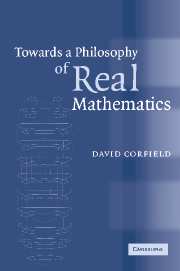Book contents
- Frontmatter
- Contents
- Preface
- 1 Introduction: a role for history
- PART I HUMAN AND ARTIFICIAL MATHEMATICIANS
- PART II PLAUSIBILITY, UNCERTAINTY AND PROBABILITY
- 5 Bayesianism in mathematics
- 6 Uncertainty in mathematics and science
- PART III THE GROWTH OF MATHEMATICS
- PART IV THE INTERPRETATION OF MATHEMATICS
- Appendix
- Bibliography
- Index
5 - Bayesianism in mathematics
Published online by Cambridge University Press: 22 September 2009
- Frontmatter
- Contents
- Preface
- 1 Introduction: a role for history
- PART I HUMAN AND ARTIFICIAL MATHEMATICIANS
- PART II PLAUSIBILITY, UNCERTAINTY AND PROBABILITY
- 5 Bayesianism in mathematics
- 6 Uncertainty in mathematics and science
- PART III THE GROWTH OF MATHEMATICS
- PART IV THE INTERPRETATION OF MATHEMATICS
- Appendix
- Bibliography
- Index
Summary
Even in the field of tautology (i.e. of what is true or false by mere definition, independently of any contingent circumstances) we always find ourselves in a state of uncertainty. In fact, even a single verification of a tautological truth (for instance, of what is the seventh, or billionth, decimal place of π, or of what are the necessary or sufficient conditions for a given assertion) can turn out to be, at a given moment, to a greater or lesser extent accessible or affected with error, or to be just a doubtful memory.
(de Finetti 1974: 24)After all, which is more compelling, a formal proof that in its full exposition requires hundreds of difficult pages of reasoning, fully understood by only two or three colleagues, or the numerical verification of a conjecture to 100,000 decimal digit accuracy, subsequently validated by numerous subsidiary computations?
(Bailey and Borwein 2001: 53)INTRODUCTION
In his Mathematics and Plausible Reasoning (Pólya 1954a, 1954b), Pólya suggests that mathematics is the perfect domain in which to devise a theory of plausible reasoning. After all, where else do you find such unequivocal instances of facts satisfying general laws, and where else do you find general laws being established so conclusively? As a noted mathematician actively engaged in research, Pólya delightfully conveys inferential patterns by means of examples of his own use of plausible reasoning to generate likely conjectures and workable strategies for their proof.
- Type
- Chapter
- Information
- Towards a Philosophy of Real Mathematics , pp. 103 - 129Publisher: Cambridge University PressPrint publication year: 2003



